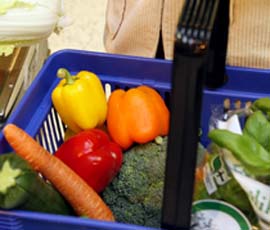Food price inflation could peak this summer

Food price inflation is likely to peak at up to 7.5% this summer, and remain strong into the winter, according to consultant European Food and Farming Partnerships.
Although general inflation dipped unexpectedly in June, retail food inflation remained at 6.9%, well above the government’s 2% general target. And it would continue to rise, to peak at between 7% and 7.5%, where it was likely to remain for the rest of the year, before dropping sharply towards 2.5% by the end of 2012, said EFFP’s report.
The forecast remained at odds with some city forecasters, who predict double-digit retail food inflation in the second half of this year. But with global grain prices slumping from record highs and supermarkets discounting groceries to boost sales, EFFP reckoned food inflation would soon come under pressure.
“Global grain markets – a key variable, as they influence not only bakery products but many other food items as well – have retreated from the highs seen in early June as weather concerns have abated, and the price of British wheat has fallen to its lowest level in six months.”
Although meat markets remained strong, they could weaken later in the year to reflect declining feed costs. “The upcoming grain harvest will be key in setting the tone for agri-food markets through the autumn and into 2012 – as ever this remains the biggest risk to our forecast at this time of year. A sharp deterioration in harvest prospects would again put upward pressure on global food prices.”
With consumers under great pressure due to higher taxes, unemployment and more expensive food and energy, household purchasing power was declining, said the report. Expenditure contracted by 0.6% in the first three months of 2011, with food becoming less affordable for only the second time in 30 years – and likely to continue that way until the end of next year.
Supermarkets were therefore heavily discounting a wide range of goods to stimulate consumer demand. “In the coming months much will depend on the response of supermarkets to increasing pressure on household incomes. There will be enormous pressure to revert to tactics designed to minimise the pass-through of higher raw material prices to consumers.”
